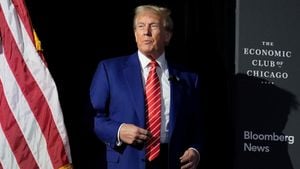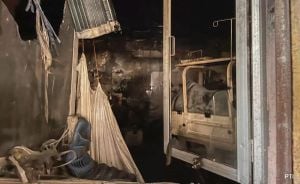Recent remarks made by Philippine Vice President Sara Duterte during an online press conference have stirred significant controversy, as she seemingly threatened to have President Ferdinand "Bongbong" Marcos Jr. assassinated should anything happen to her. During the event, prompted by inquiries about her safety, Duterte stated, "If I’m killed, you’ll kill BBM, Liza Araneta, and Martin Romualdez. No joke, no joke." This shocking comment drew immediate backlash and raised alarm about the political climate within the nation.
The vice president elaborated on her ominous statement, claiming she had already contacted someone to carry out the supposed hit: "I’ve told him, ‘If I die, don’t stop until you’ve killed them all.’ And he said, ‘yes’.” Duterte insisted her comment should not be construed as frivolous, reiterably emphasizing, "No joke, no joke.” Such blunt rhetoric has put her safety and political career under scrutiny, with accusations of threats to the president fueling tensions between the two leaders.
Reacting to the shocking comments, President Marcos addressed the situation, condemning Duterte's remarks. He stated, "If it is so easy to threaten the life of a president, how much more for ordinary citizens?" He described the threats as potential criminal intent, pledging not to let the issue slide. Marcos remarked, "Such criminal intent should never be tolerated," indicating he was prepared to take action against any threats against his administration.
Further developments led to Duterte being subpoenaed as part of the investigation, with Justice Undersecretary Jesse Andres confirming the probe aimed at dissecting the premeditated nature of Duterte’s comments. This inquiry indicates serious concerns among law enforcement and government circles over the potential risks associated with these threats, prompting heightened security arrangements for the President and his family.
After the initial backlash, Duterte attempted to clarify her comments, insisting they were misconstrued. "Why would I kill him if not for revenge from the grave?" she argued, attempting to downplay her earlier statements. Her insistence, alongside claims of fears for her own safety, has not abated calls for accountability.
The backdrop of this dramatic political standoff is rooted deeply within the complex and, at times, hostile relationship between Marcos and Duterte. Their respective families have longstanding political legacies: Marcos's father ruled under martial law, whereas Duterte's father, Rodrigo Duterte, presided over controversial policies during his term as president. Despite winning their positions on the platform of unity, their alliance has soured significantly since they took office, leading to growing public disagreements and accusations.
Prior to her incendiary comments, Duterte was already dealing with political turmoil surrounding the detention of her chief of staff, Zuleika Lopez, who faced allegations of obstructing investigations related to impersonation during congressional inquiries. The strife within her ranks and the shockwaves from her words raised serious concerns about governance stability and public safety.
These latest events have rekindled broader conversations concerning political discourse and the prevalence of violence within the political sphere. The situation is under watch as it could present grave repercussions for the upcoming national elections, with observers wary of how this could affect political alliances and citizen trust.
The Armed Forces of the Philippines have also assured the public of their nonpartisan commitment, emphasizing unity among the ranks during this turbulent time. Military Chief Gen. Romeo Brawner has called for calm, stressing the need to resist divisive elements within the society. The security response not only encompasses presidential protection but serves to assure the populace of continued stability amid rising tensions.
Overall, the political climate in the Philippines is increasingly fraught, highlighted by personal conflicts between top leaders and allegations of potential violence. The ramifications of Sara Duterte's comments and the resulting investigation shine a light on the need for measured political discourse and respect for democratic institutions. Whether these events galvanize political reform or exacerbate existing fractures within governance remains to be seen.



